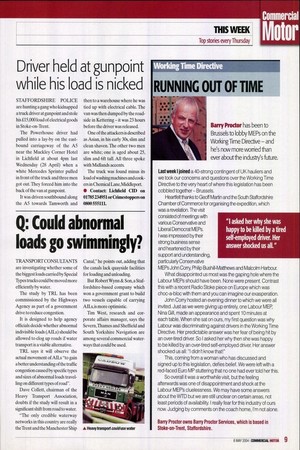Q: Could abnormal loads go swimmingly?
Page 9

If you've noticed an error in this article please click here to report it so we can fix it.
TRANSPORT CONSULTANTS are investigating whether some of the biggest loads carried by Special Types trucks could be moved more efficiently by water.
The study by TRL has been commissioned by the Highways Agency as part of a government drive to reduce congestion.
It is designed to help agency officials decide whether abnormal indivisible loads (Alls) should be allowed to clog up roads if water transport is a viable alternative.
TRL says it will observe the actual movement of Ails "to gain abetter understanding of the traffic congestion caused by specific types and sizes of abnormal loads travelling on different types of road".
Dave Collett, chairman of the Heavy Transport Association, doubts if the study will result in a significant shift from road to water. "The only credible waterway networks in this country are really the Trent and the Manchester Ship
Canal," he points out, adding that the canals lack quayside facilities for loading and unloading.
But Robert Wynn & Son, a Staffordshire-based company which won a government grant to build two vessels capable of carrying AILs, is more optimistic.
Tim West, research and corporate affairs manager, says the Severn, Thames and Sheffield and South Yorkshire Navigation are among several commercial waterways that could be used.


























































































































































































